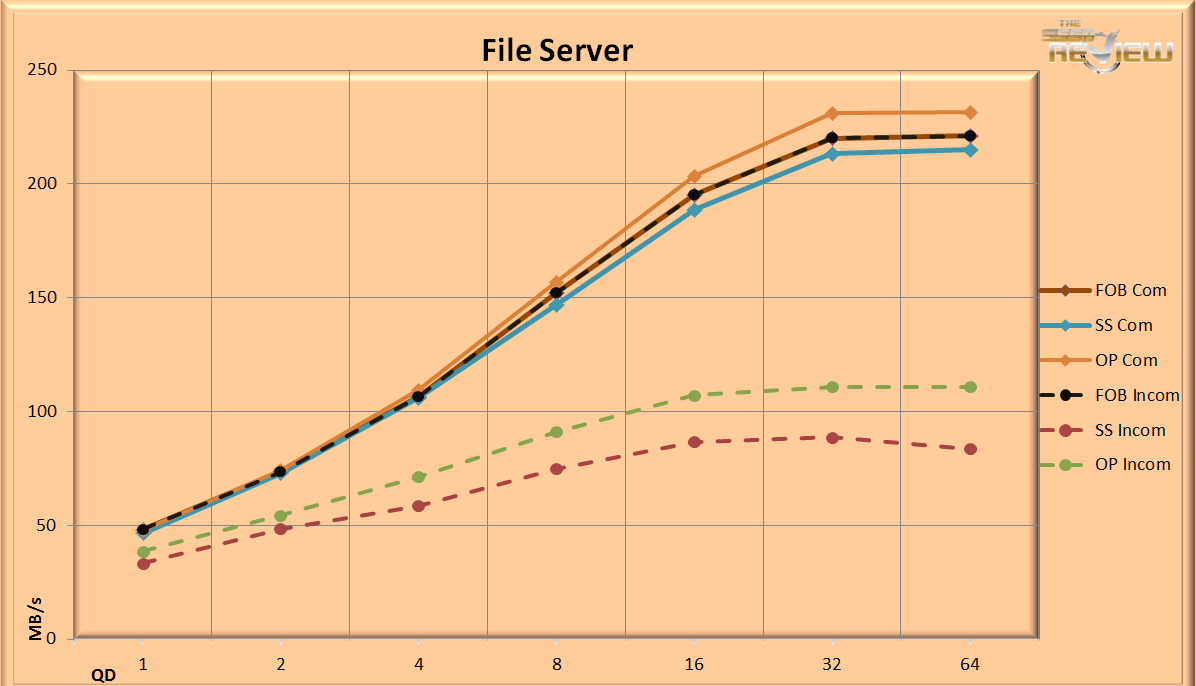SERVER PROFILES
The File Server profile emulates usage in a file server environment with a vast range of file sizes being accessed simultaneously. This type of file access is 80% read and 20% write. The performance does vary from Steady State and Overprovisioned, showing that with the proper tuning these drives can be optimized for their environment. Depending upon the type of files that are being hosted, for compressible data it will perform at much higher levels. Even with the incompressible data these SSDs are still exponentially faster than HDDs.
The file server profile shows some excellent performance in steady state, pulling off 214 MB/s at QD64 with compressible data, and 83.44 for incompressible data. There is also an appreciable gain to be had with overprovisioning for both compressible and incompressible data, bringing the speeds up to 231MB/s and 111MB/s respectively.
 The Email profile is an emulation of a mail server, with a 50% Read and 50% Write mixed workload with very small 8KB files. This can be a very stressful test for even the best of drives. These workloads tend to fall into more of the incompressible data pattern. The XceedStor 500S tops out at 147.6 MB/s with compressible, and 43.79 with incompressible data at QD32 in steady state. Mixing in extra OP brings those results up to 168.7 and 58.6 respectively.
The Email profile is an emulation of a mail server, with a 50% Read and 50% Write mixed workload with very small 8KB files. This can be a very stressful test for even the best of drives. These workloads tend to fall into more of the incompressible data pattern. The XceedStor 500S tops out at 147.6 MB/s with compressible, and 43.79 with incompressible data at QD32 in steady state. Mixing in extra OP brings those results up to 168.7 and 58.6 respectively.
 The Database/OLTP (On-Line Transaction Processing) profile is another heavy-usage type of access that can bring many drives, even those with superior write performance, to their knees given Steady State conditions. With small 8K random data being read at 66% and written simultaneously at 33%, this is a very demanding workload. The SSD comes in with 255.3MB/s at QD32 with compressible data, and 58.64 MB/s with incompressible.
The Database/OLTP (On-Line Transaction Processing) profile is another heavy-usage type of access that can bring many drives, even those with superior write performance, to their knees given Steady State conditions. With small 8K random data being read at 66% and written simultaneously at 33%, this is a very demanding workload. The SSD comes in with 255.3MB/s at QD32 with compressible data, and 58.64 MB/s with incompressible.
Databases tend to be extremely compressible, so in real deployments look for the performance to be along the upper lines.
 The Web Server profile is read only over a wide range of file sizes, with pure random data. As we can see there is very little variability for any drive state, or when using compressible and incompressible data. As a whole, the compressibility of data does not affect the read speed, so this performance is very good.
The Web Server profile is read only over a wide range of file sizes, with pure random data. As we can see there is very little variability for any drive state, or when using compressible and incompressible data. As a whole, the compressibility of data does not affect the read speed, so this performance is very good.
This profile really highlights a type of usage that this device will be deployed into heavily. Tuned for read-heavy environments, this SSD performs spectacularly for its price point with both compressible and incompressible data.
 The IOPS per Watt measurements below take the performance of the SSD at QD32 compared to the amount of wattage that we recorded being consumed.
The IOPS per Watt measurements below take the performance of the SSD at QD32 compared to the amount of wattage that we recorded being consumed.
The XceedStor 500S does very well in the IOPS/Watts measurements, with 10,998 for the 4K read IOPS when measured with compressible data. Bear in mind that these 4k random read speeds do not vary by wide margins with incompressible data.
With the 4k Write IOPS we do see more variability between the IOPS/Watts numbers. Factoring in the compression, the results are superb, with the XceedStor 500S outstripping much of the competition. For users with highly compressible workloads the SandForce processor can bring big performance gains. The nice scaling that is present with the extra OP also represents a tangible benefit to users who wish to utilize this device in workloads with heavier write percentages.
 The SSD Review The Worlds Dedicated SSD Education and Review Resource |
The SSD Review The Worlds Dedicated SSD Education and Review Resource | 